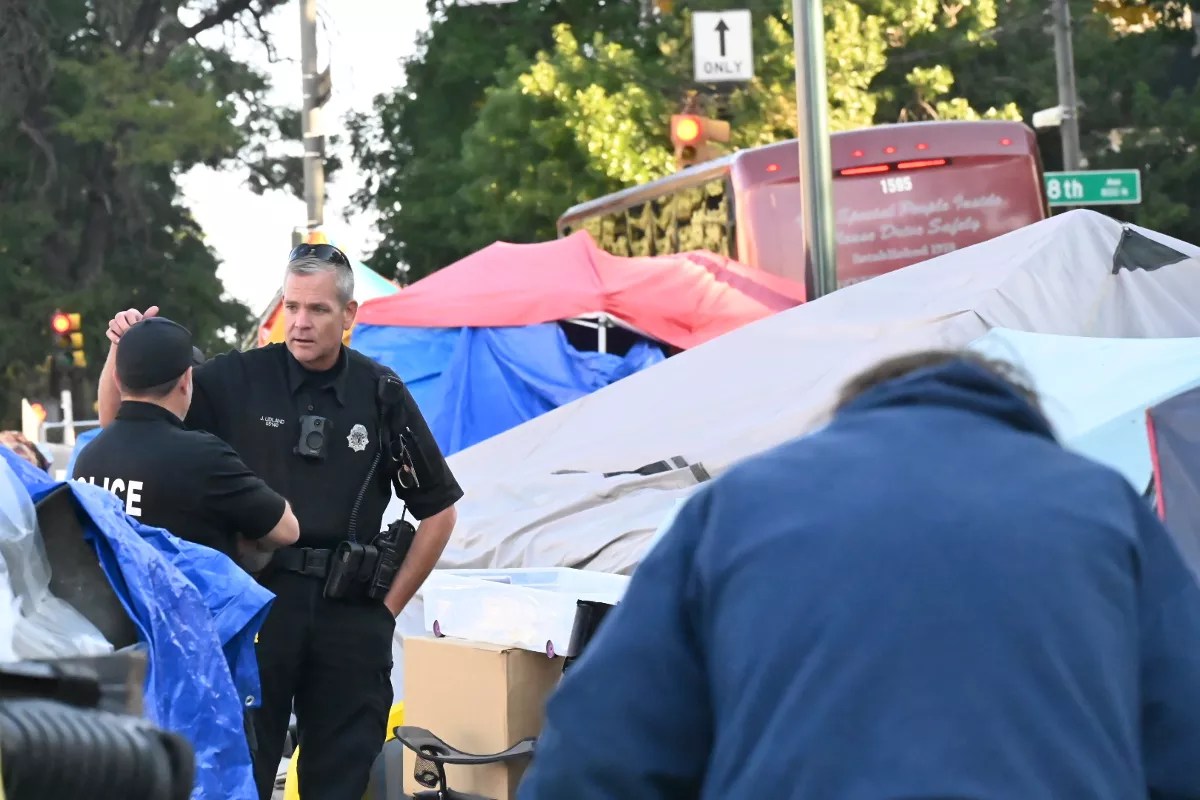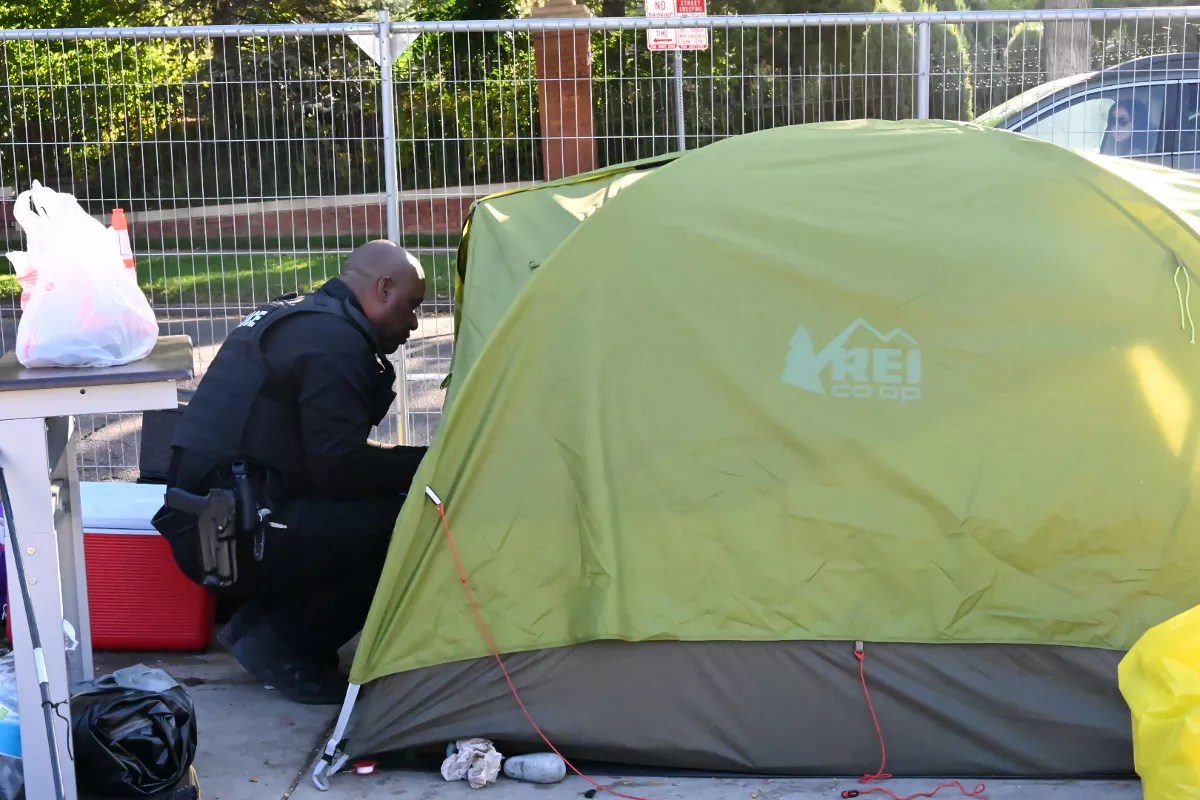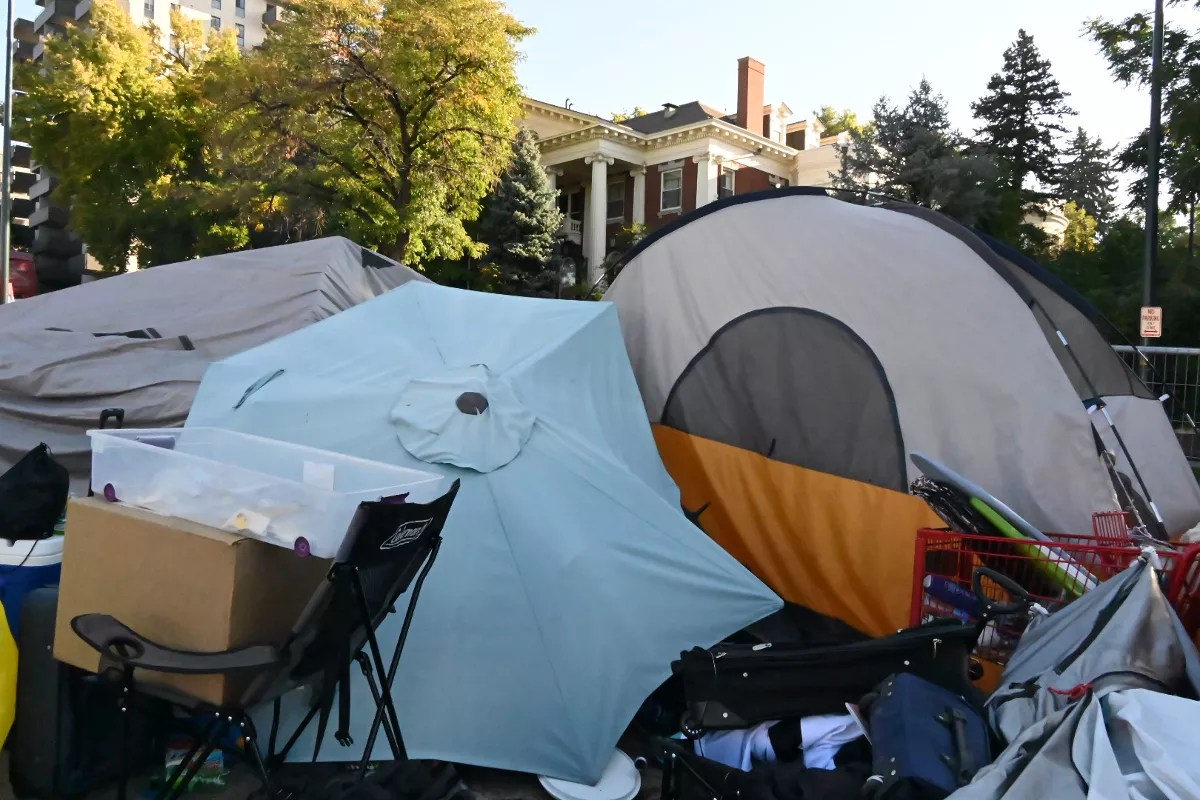
Bennito L. Kelty

Audio By Carbonatix
At around 8:30 a.m. on Tuesday, September 26, three Denver police officers started walking through the fenced-off homeless encampment at Eighth Avenue and Logan Street in front of the Governor’s Mansion in Capitol Hill. “Hi, good morning,” one cop said as he leaned into the entrance of a tent. “We’re here to clear this area out. Did you know that was happening today?”
The person inside, who spoke to Westword and asked to be identified only by his first name, Will, told the officer he had no idea.
“You’re going to have to pack up and get outside the perimeter,” the cop said, referring to the chain-link fence that city workers came to install around the encampment an hour earlier as part of a city-ordered sweep. “By ten o’clock, everything is going to have to be packed up and put outside of the perimeter here.”
This was the third time since the beginning of August that Mayor Mike Johnston had sent police to tell homeless people living at an encampment to clear out or be ticketed for violating the city’s camping ban. The police have also been doing “soft sweeps,” where they stop by encampments to warn residents that they’re violating a city ordinance but don’t technically force them to move.
“I didn’t know,” Will, who had been at the encampment for a week, repeatedly insisted.
“I heard people say they might be putting people in housing, busing them out. But I didn’t hear anything from the city,” he added. “I didn’t really know what to think about it.”
Despite Will’s situation, the City of Denver did have notices posted on light poles around the Governor’s Mansion encampment in the days leading up to the sweep, and city employees had been coming by to tell people about what was going on for at least a week, according to others in the encampment.
When asked where he plans to go, Will told Westword: “I’ll look for a good spot. Camping’s illegal in the city, but I don’t really know any decent place to go.”
Tuesday’s sweep marked the first time that Mayor Johnston carried out such an operation while also moving some of the residents from the encampment into temporary housing. Members of his staff teamed up with Denver’s Department of Housing Stability to keep watch, provide water and snacks, and help residents who might need assistance during the sweep, along with staff from the office of Councilwoman Sarah Parady, an at-large representative.
The previous sweeps have been done out of concerns for public health – which was the case with the first one, at 22nd and Stout streets – and public safety, as with the second sweep, on the 1700 block of Logan, up the street from Tuesday’s sweep.
According to the mayor’s office, about seventy people from the Governor’s Mansion encampment were registered to live in transitional housing at the Best Western Central Park hotel on Quebec Street. A bus was also present at the sweep to take residents to the hotel. About a couple dozen residents were at the site on Tuesday morning, though the encampment was already much smaller at that point than it had been in previous days.
Some of its residents went to a Safe Outdoor Space, according to a city statement, while others went to “direct housing placements.”
The city finalized the purchase of the Best Western earlier this year to convert its rooms into 194 units of transitional and affordable housing. Now Johnston is using the newly acquired property to test out his plans to move 1,000 people off the streets and into housing by the end of the year, as he’s publicly vowed.

A Denver police officer tells a homeless resident at Eighth Avenue and Logan Street that he has to move.
Bennito L. Kelty
As of Tuesday, the mayor had housed 106 homeless residents, including 25 at micro-communities and six at converted hotels, according to a recently created housing and shelter dashboard. Thirty-five of the newly housed residents are in leased rental units paid for with housing vouchers or other subsidies.
Since the encampment in front of the Governor’s Mansion had more than seventy residents, many were left on the sidelines when city workers came to sign people up for rooms at the Best Western. Multiple people collecting their belongings on Tuesday morning told Westword they had no place to go.
“Right now, I don’t know where I’m going,” said Maurice Richardson, a 47-year-old homeless resident who had been at the encampment for four weeks before the sweep. He has cancer and claims to have missed the opportunity to sign up for a hotel room because he had been in chemotherapy that day.
“I didn’t get a room, and they’re trying to put me in a shelter – a dirty, nasty shelter – with people fighting and drug use,” he said. “I can’t be up around that stuff with my sickness. They promised to put us all in homes, but I didn’t get one. I don’t know where the hell I’m going this morning.”
According to Richardson, the city recommended that he stay at the Denver Rescue Mission’s Lawrence Street shelter. But he told Westword he “can’t handle” the conditions at the shelter and is just going to find another encampment where he can stay for a while.
“I’m not going to a shelter; it’ll knock me down more,” he said. “You might as well leave us on this corner until you finish your project. Why displace us and make us do all this moving and shit?”
Residents at the encampment said that people from the city first appeared at the site two weeks ago to sign individuals up for housing before returning the following week to complete the intake process by collecting names. According to a statement from Mayor Johnston’s office, “the list for housing resources for 8th and Logan was gathered throughout the week of Sept. 11, and all individuals present were offered a housing resource.”
Johnston’s office added, “If folks were not living at the encampment at the time of name collection, their name would not have been collected. Those who arrived after that time may have been added to a standby list.”
The city also notes that after the initial engagement and information swap with residents about the housing resource, “We did see an increase of people moving into that encampment.”
A homeless resident who asked to go only by her first name, Michelle, was one of the lucky few to get on the list for housing. She had been at the Governor’s Mansion encampment for about a month and said others told her that the city was there doing a survey for housing. Residents had to get their name on the list by noon on September 15 to get selected, according to Michelle.
“They came down, they were doing a survey – that’s how I heard about it – and if you were on the list by noon that Friday, the whole next week they did intake,” she said. “They were kind of lining it up with the sweep. Monday we had to leave to the hotel. Tuesday they swept us.”

Tents and belongings were stacked up and crowded together just outside the Governor’s Mansion at Eighth Avenue and Logan Street.
Bennito L. Kelty
Another resident of the encampment who had been living there for six weeks, Bobby Lively, said he was put on a standby list on Monday to get into a hotel room, but he doesn’t trust the city to take care of him or the friends he has at the encampment.
Johnston is “keeping up with his campaign promise,” Lively said. “It’s a gesture – move everybody into a hotel. Most of us out here are caught up hard-core in our addictions. We usually at least need cigarettes, and I don’t know if [the city] would let us have that at the hotel. A lot of us are hoarders, and what if they only let us take a couple bags? I’ve been in housing before. It isn’t easy.”
Another encampment resident who has been traveling with Lively, Mindy Polson, said she missed the chance to get a room because she had a court date. “I was here all week, but I had to leave the morning they took the list. They didn’t tell us that they were going to be there,” Polson recalled. “We’re keeping tabs, seeing what else we can find.”
The city will attempt to keep the encampment closed, according to a statement from the mayor’s office. “DPD will perform regular roving patrols of specific encampment areas that have been officially closed and have gone through the encampment resolution process,” it reads. “Additionally, per normal operations, the public may report any camping in the closed encampment area through calling 3-1-1.”
One resident who goes by Wylie was lucky enough to get a room after living on the streets of Denver for five years. He once worked as an interpreter during the Libyan civil war a decade ago.
Michelle and Wylie told Westword that city workers informed them they would only be able to stay at the Best Western for ninety days with a possible thirty-day extension, if needed. Michelle said they told her she’ll have to check in each morning or the city employees would do a mandatory wellness check.
“Some people didn’t know” that the city was putting people in housing, according to Wylie.
“I tried to let as many people know as I could, but everything [happened] fast,” he said.
Once his ninety days runs out, Wylie – who was optimistic about a chance at housing – said he’ll move out of the Best Western and into an apartment. “I have to,” he insisted.
“You have to keep moving straight. If somebody’s down and they stay down, it’s depression that’ll get to them. All I have to say is they need to keep going straight. If I don’t have to worry about housing, I can find a job and get some momentum from that. It’s easy to get a job, but it’s hard to get an apartment.”